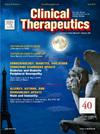Anticancer Drugs Associated With Tumor Lysis Syndrome: Insights From the US Food and Drug Administration Adverse Event Reporting System
IF 3.6
4区 医学
Q2 PHARMACOLOGY & PHARMACY
引用次数: 0
Abstract
Purpose
Tumor lysis syndrome (TLS) is a life-threatening metabolic emergency caused by rapid tumor cell breakdown, either spontaneously or after therapy, leading to electrolyte imbalances that can result in acute kidney injury, arrhythmias, seizures, and multiorgan failure. Despite its clinical importance, the relationship between anticancer drugs and TLS, particularly newer targeted therapies, remains poorly understood.
Methods
We analyzed the US Food and Drug Administration (FDA) Adverse Events Reporting System database, a repository of adverse events associated with medical products, to identify TLS cases reported from the first quarter of 2004 to the third quarter of 2024. For signal detection, we used disproportionality analysis with 4 algorithms—reported odds ratio, proportional reporting ratio, Bayesian confidence propagation neural network, and empirical Bayes geometric mean. These algorithms assessed statistical correlations between anticancer drugs and TLS, based on a 2 × 2 contingency table framework.
Findings
From the first quarter of 2004 to the third quarter of 2024, a total of 7340 TLS cases were documented in the FDA Adverse Events Reporting System database. Clinical characteristics, including age, sex, and outcomes, were analyzed. Among all reported TLS cases, 53.0% were men, and the mean age across all individuals was 56.9 ± 21.5 years. The incidence of TLS peaked in 2022, with a 42% increase from 2016 to 2017. A total of 118 antineoplastic drugs were identified as highly associated with TLS, of which only 18 had FDA-labeled TLS-related adverse reactions. Chemotherapy drugs were the most frequently associated with TLS. Venetoclax emerged as the top drug associated with TLS, comprising 10.72% of all TLS reports.
Implications
Our findings highlight critical drug-induced TLS associations, particularly with emerging targeted therapies such as venetoclax. The study underscores the need for clinicians to monitor TLS closely in patients receiving certain anticancer treatments and to refine therapeutic strategies to mitigate TLS risk, ensuring safer cancer care outcomes. Further longitudinal studies are warranted to validate these findings and enhance pharmacovigilance efforts.
与肿瘤溶解综合征相关的抗癌药物:来自美国食品和药物管理局不良事件报告系统的见解。
目的:肿瘤溶解综合征(Tumor lysis syndrome, TLS)是一种危及生命的代谢急症,由肿瘤细胞自发或治疗后快速分解引起,导致电解质失衡,可导致急性肾损伤、心律失常、癫痫发作和多器官衰竭。尽管具有重要的临床意义,但抗癌药物和TLS之间的关系,特别是新的靶向治疗,仍然知之甚少。方法:我们分析了美国食品和药物管理局(FDA)不良事件报告系统数据库(与医疗产品相关的不良事件存储库),以确定2004年第一季度至2024年第三季度报告的TLS病例。对于信号检测,我们使用了4种算法的歧化分析——报告比值比、比例报告比、贝叶斯置信传播神经网络和经验贝叶斯几何平均。这些算法基于2 × 2列联表框架评估抗癌药物与TLS之间的统计相关性。结果:从2004年第一季度到2024年第三季度,FDA不良事件报告系统数据库中共记录了7340例TLS病例。分析临床特征,包括年龄、性别和结果。在所有报告的TLS病例中,53.0%为男性,所有个体的平均年龄为56.9±21.5岁。TLS的发病率在2022年达到顶峰,从2016年到2017年增加了42%。共有118种抗肿瘤药物被鉴定为与TLS高度相关,其中只有18种有fda标记的TLS相关不良反应。化疗药物最常与TLS相关。Venetoclax是与TLS相关最多的药物,占所有TLS报告的10.72%。意义:我们的研究结果强调了关键的药物诱导TLS关联,特别是新兴的靶向治疗,如venetoclax。该研究强调了临床医生需要密切监测接受某些抗癌治疗的患者的TLS,并改进治疗策略以降低TLS风险,确保更安全的癌症治疗结果。需要进一步的纵向研究来验证这些发现并加强药物警戒。
本文章由计算机程序翻译,如有差异,请以英文原文为准。
求助全文
约1分钟内获得全文
求助全文
来源期刊

Clinical therapeutics
医学-药学
CiteScore
6.00
自引率
3.10%
发文量
154
审稿时长
9 weeks
期刊介绍:
Clinical Therapeutics provides peer-reviewed, rapid publication of recent developments in drug and other therapies as well as in diagnostics, pharmacoeconomics, health policy, treatment outcomes, and innovations in drug and biologics research. In addition Clinical Therapeutics features updates on specific topics collated by expert Topic Editors. Clinical Therapeutics is read by a large international audience of scientists and clinicians in a variety of research, academic, and clinical practice settings. Articles are indexed by all major biomedical abstracting databases.
 求助内容:
求助内容: 应助结果提醒方式:
应助结果提醒方式:


